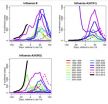(Press-News.org) The American public can expect to add earlier and more severe flu seasons to the fallout from climate change, according to a research study published online Jan. 28 in PLOS Currents: Influenza.
A team of scientists led by Sherry Towers, research professor in the Mathematical, Computational and Modeling Sciences Center at Arizona State University, studied waves of influenza and climate patterns in the U.S. from the 1997-1998 season to the present.
The team's analysis, which used Centers for Disease Control data, indicates a pattern for both A and B strains: warm winters are usually followed by heavy flu seasons.
"It appears that fewer people contract influenza during warm winters, and this causes a major portion of the population to remain vulnerable into the next season, causing an early and strong emergence," says Towers. "And when a flu season begins exceptionally early, much of the population has not had a chance to get vaccinated, potentially making that flu season even worse."
The current flu season, which is still in high gear in parts of the nation, began early and fiercely. It followed a relatively light 2011 season, which saw the lowest peak of flu since tracking efforts went into effect, and coincided with the fourth warmest winter on record. According to previous studies, flu transmission decreases in warm or humid conditions.
If global warming continues, warm winters will become more common, and the impact of flu will likely be more heavily felt, say the study's authors.
Mathematical epidemiologist Gerardo Chowell-Puente, an associate professor in the School of Human Evolution and Social Change in the College of Liberal Arts and Sciences, adds that the findings could inform preparedness efforts following mild winters: "The expedited manufacture and distribution of vaccines and aggressive vaccination programs could significantly diminish the severity of future influenza epidemics."
INFORMATION:
This study was partially supported by the Multinational Influenza Seasonal Mortality Study, overseen by the National Institutes of Health's Fogarty International Center. Other team members are Rasheed Hameed, Matthew Jastrebski, Maryam Khan, Jonathan Meeks, Anuj Mubayi and George Harris of Northeastern Illinois University. The goal of the overarching study is to better grasp the character and trajectory of influenza in all its forms.
Study shows climate change could affect onset and severity of flu seasons
2013-01-29
ELSE PRESS RELEASES FROM THIS DATE:
Research: Military women may have higher risk for STIs
2013-01-29
As the number of women in the military increases, so does the need for improved gynecologic care. Military women may be more likely to engage in high-risk sexual practices, be less likely to consistently use barrier contraception, and, therefore, more likely to contract sexually transmitted infections (STIs), according to research recently released by a physician at Women & Infants Hospital of Rhode Island.
Vinita Goyal, MD, MPH, followed up earlier research into the rates of contraception use and unintended pregnancy by today's military women and veterans with her latest ...
USGS-NOAA: Climate change impacts to US coasts threaten public health, safety and economy
2013-01-29
According to a new technical report, the effects of climate change will continue to threaten the health and vitality of U.S. coastal communities' social, economic and natural systems.
The report, Coastal Impacts, Adaptation, and Vulnerabilities: a technical input to the 2013 National Climate Assessment, authored by leading scientists and experts, emphasizes the need for increased coordination and planning to ensure U.S. coastal communities are resilient against the effects of climate change.
The recently released report examines and describes climate change impacts ...
When food porn holds no allure: The science behind satiety
2013-01-29
New research from the University of British Columbia is shedding light on why enticing pictures of food affect us less when we're full.
"We've known that insulin plays a role in telling us we're satiated after eating, but the mechanism by which this happens is unclear," says Stephanie Borgland, an assistant professor in UBC's Dept. of Anesthesiology, Pharmacology and Therapeutics and the study's senior author.
In the new study published online this week in Nature Neuroscience, Borgland and colleagues found that insulin – prompted by a sweetened, high-fat meal – affects ...
Power helps you live the good life by bringing you closer to your true self
2013-01-29
How does being in a position of power at work, with friends, or in a romantic relationship influence well-being? While we might like to believe the stereotype that power leads to unhappiness or loneliness, new research indicates that this stereotype is largely untrue: Being in a position of power may actually make people happier.
Drawing on personality and power research, Yona Kifer of Tel Aviv University in Israel and colleagues hypothesized that holding a position of authority might enhance subjective well-being through an increased feeling of authenticity. The researchers ...
Artificial pancreas: The way of the future for treating type 1 diabetes
2013-01-29
Montréal, January 28, 2013 – IRCM researchers, led by endocrinologist Dr. Rémi Rabasa-Lhoret, were the first to conduct a trial comparing a dual-hormone artificial pancreas with conventional diabetes treatment using an insulin pump and showed improved glucose levels and lower risks of hypoglycemia. Their results, published today in the Canadian Medical Association Journal (CMAJ), can have a great impact on the treatment of type 1 diabetes by accelerating the development of the external artificial pancreas.
The artificial pancreas is an automated system that simulates ...
Why are there redheads? Birds might hold the clues
2013-01-29
Red coloration—historically seen as costly in vertebrates—might represent some physiological benefit after all, according to research published in the journal Physiological and Biochemical Zoology.
Pheomelanin, which is responsible for red hair and freckles in humans and orange and chestnut coloration in other animals, is known to increase the damage to skin cells and melanoma risk when present in large amounts. Furthermore, its creation involves the consumption of glutathione, a beneficial antioxidant.
In an attempt to unearth the factors favoring the evolution of ...
AGU Journal Highlights -- Jan. 28, 2013
2013-01-29
The following highlights summarize research papers that have been recently published in Geophysical Research Letters (GRL), Water Resources Research, Journal of Geophysical Research – Planets (JGR-E), Journal of Geophysical Research – Oceans (JGR-C), and Journal of Geophysical Research-Biogeosciences (JGR-G).
In this release:
1. Io's volcanism controls Jupiter's magnetospheric activity
2. Projected U.S. water use likely to increase as climate warms
3. Mercury's crust likely made of magnesium-rich basalt
4. Assessing the Great Whirl, despite all the pirates
5. Tracing ...
Bioinspired fibers change color when stretched
2013-01-29
Cambridge, Mass. – January 28, 2013 - A team of materials scientists at Harvard University and the University of Exeter, UK, have invented a new fiber that changes color when stretched. Inspired by nature, the researchers identified and replicated the unique structural elements that create the bright iridescent blue color of a tropical plant's fruit.
The multilayered fiber, described today in the journal Advanced Materials, could lend itself to the creation of smart fabrics that visibly react to heat or pressure.
"Our new fiber is based on a structure we found in nature, ...
Innovative uses of nanotechnology in food and agriculture
2013-01-29
New Rochelle, NY, January 28, 2013—The U.S. Department of Agriculture (USDA) invests nearly $10 million a year to support about 250 nanoscale science and engineering projects that could lead to revolutionary advances in agriculture and food systems. Examples of current projects in development are presented in a Special Research Section published in Industrial Biotechnology, a peer-reviewed journal from Mary Ann Liebert Inc., publishers. The articles are available on the Industrial Biotechnology website.
In their introductory article, "Overview: Nanoscale Science and ...
Skin, soft tissue infections succumb to blue light
2013-01-29
Blue light can selectively eradicate Pseudomonas aeruginosa infections of the skin and soft tissues, while preserving the outermost layer of skin, according to a proof-of-principle study led by Michael R. Hamblin of the Massachusetts General Hospital, and the Harvard Medical School, Boston. The research is published online ahead of print in the journal Antimicrobial Agents and Chemotherapy
"Blue light is a potential non-toxic, non-antibiotic approach for treating skin and soft tissue infections, especially those caused by antibiotic resistant pathogens," says Hamblin. ...


